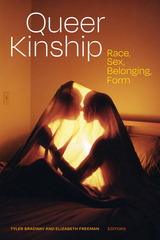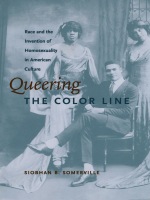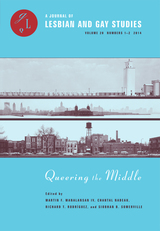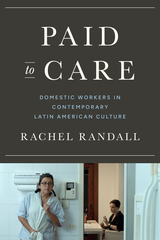4 start with Q start with Q

Contributors. Aqdas Aftab, Leah Claire Allen, Tyler Bradway, Juliana Demartini Brito, Judith Butler, Dilara Çalışkan, Christopher Chamberlin, Aobo Dong, Brigitte Fielder, Elizabeth Freeman, John S. Garrison, Nat Hurley, Joseph M. Pierce, Mark Rifkin, Poulomi Saha, Kath Weston

In the first section of this issue, Race and Queer Sexuality, international authors address topics ranging from Asian American queer identity and its relation to transnational and diasporic concerns to homophobia and its relationship to black nationalism in South Africa. Other subjects include, sexuality, race, and public space; lesbian pedagogy and the nation in Latin America; and an analysis of cross-race and cross-gender drag in the work of L.A. drag queen Vaginal Creme Davis. In the second section, The Politics of Transgression, contributors focus on transgression and its relationship to power and history. One essay explores Irish immigration in the U.S. and the Irish female body as a figure of transnational contagion and blood panic, while another focuses on Oscar Wilde, race, and queer sexuality. Other pieces include a meditation on British filmmaker and writer Derek Jarman’s film, Blue.
Race and Queer Sexuality confronts the limitations of prior work in queer theory while providing a starting point for discussion of race, queer sexuality, and the politics of transgression that will be part of queer theory of the future.
Contributors. Judith Butler, David Eng, Licia Fiol-Mata, Judith Halberstam, Phillip Brian Harper, Neville Hoad, Rachel Holmes, Don Kulick, Tim Lawrence, Rosalind Morris, José Esteban Muñoz, Ben Singer, David Valentine, Priscilla Wald, Riki Anne Wilchins

At about the same time that the 1896 Supreme Court Plessy v. Ferguson decision hardened the racialized boundary between black and white, prominent trials were drawing the public’s attention to emerging categories of sexual identity. Somerville argues that these concurrent developments were not merely parallel but in fact inextricably interrelated and that the discourses of racial and sexual “deviance” were used to reinforce each other’s terms. She provides original readings of such texts as Havelock Ellis’s late nineteenth-century work on “sexual inversion,” the 1914 film A Florida Enchantment, the novels of Pauline E. Hopkins, James Weldon Johnson’s Autobiography of an Ex-Coloured Man, and Jean Toomer’s fiction and autobiographical writings, including Cane. Through her analyses of these texts and her archival research, Somerville contributes to the growing body of scholarship that focuses on discovering the intersections of gender, race, and sexuality.
Queering the Color Line will have broad appeal across disciplines including African American studies, gay and lesbian studies, literary criticism, cultural studies, cinema studies, and gender studies.

The introduction provides a discussion of the theoretical and critical motivations for understanding the middle as a queer vantage, while the six articles focus on social movements, queer community networks, Midwest-based expressive cultures, and local and diasporic rearticulations of racial, gender, and sexual politics.
At the University of Illinois at Urbana-Champaign, Martin Manalansanis Associate Professor in the Department of Anthropology, Chantal Nadeau is Professor and Chair of Gender and Women’s Studies, and Richard T. Rodríguez and Siobhan B. Somerville are Associate Professors in the Department of English.
READERS
Browse our collection.
PUBLISHERS
See BiblioVault's publisher services.
STUDENT SERVICES
Files for college accessibility offices.
UChicago Accessibility Resources
home | accessibility | search | about | contact us
BiblioVault ® 2001 - 2024
The University of Chicago Press









